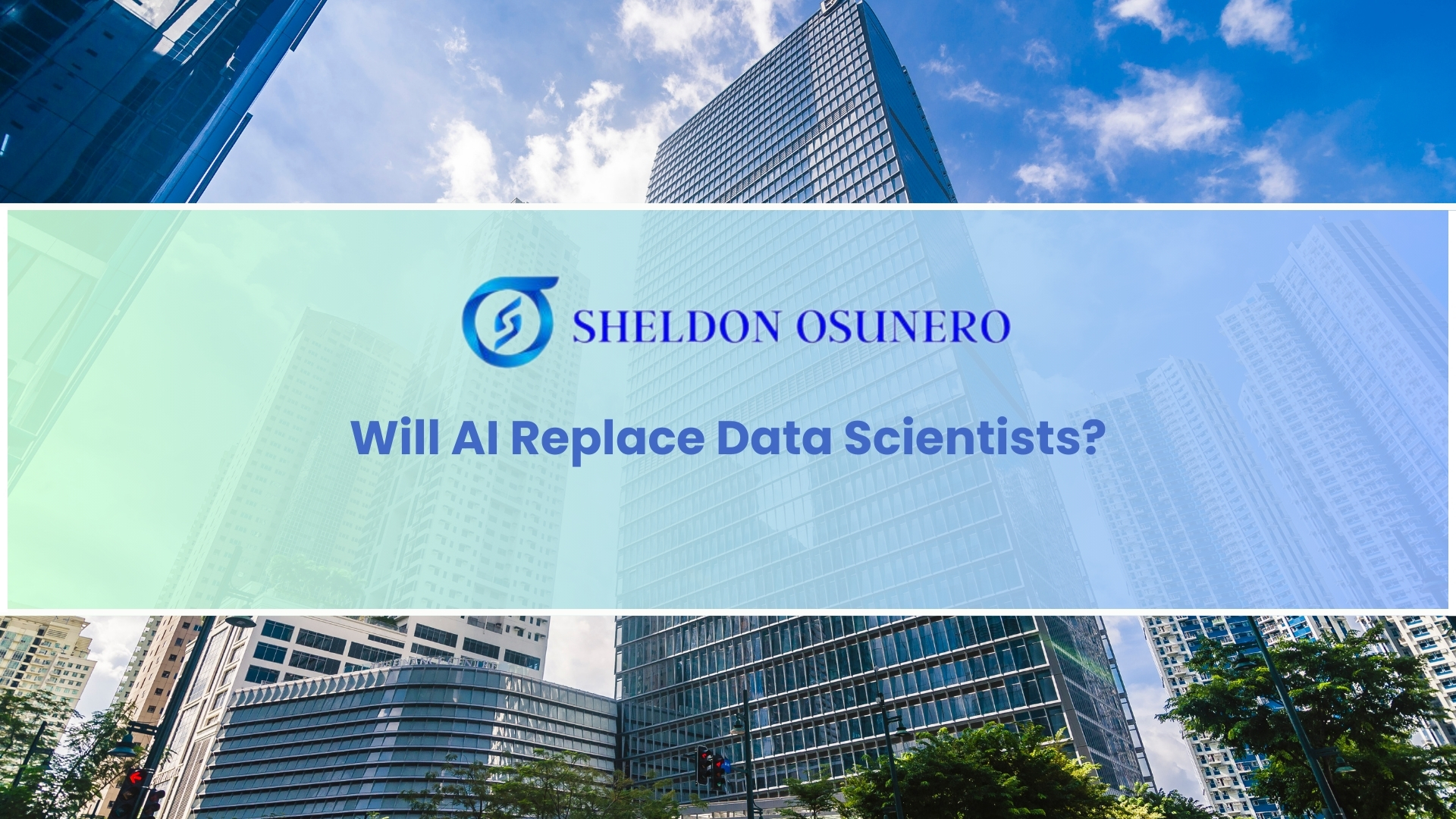Artificial Intelligence (AI) has revolutionized numerous industries, from healthcare to finance, by automating complex tasks and enabling data-driven decision-making. This rapid advancement has led to growing concerns about the future of certain professions, particularly data science. As AI becomes more sophisticated, many are left wondering: will AI replace data scientists? This question is not only relevant but also crucial as businesses increasingly rely on AI technologies. In this blog, we’ll explore the evolving relationship between AI and data science, assess the potential for AI to replace data scientists, and consider the implications for the future of this profession.
The Role of AI in Data Science
AI and data science are often discussed in tandem, but it’s essential to understand the distinction between the two. Data science involves extracting insights from large volumes of data, utilizing techniques from statistics, machine learning, and data mining. It requires a deep understanding of the data, the ability to create complex models, and the skill to interpret results in a meaningful way.
Conversely, artificial intelligence describes the simulation of human intelligence by machines. AI algorithms can process data at scale, recognize patterns, and make decisions with minimal human intervention. Machine learning (ML), a subset of AI, plays a significant role in data science by automating the process of building models that predict outcomes based on data.
AI has already started to transform the data science landscape by automating repetitive tasks, such as data cleaning, feature selection, and even some aspects of model building. Tools like AutoML (Automated Machine Learning) allow users to create and deploy machine learning models without deep expertise in data science. These advancements have led to the argument that AI could eventually replace data scientists.
Can AI Fully Replace Data Scientists?
While AI can handle many tasks traditionally performed by data scientists, it is unlikely to fully replace them. Here are a few reasons why:
1. Complex Problem-Solving and Creativity
Data science is not just about running algorithms on datasets. It involves understanding the problem at hand, designing an appropriate approach, and interpreting the results in the context of the business problem. AI is excellent at processing data and identifying patterns, but it lacks the creativity and domain expertise required to formulate complex problems and design innovative solutions.
For instance, determining the right features to include in a model or understanding the nuances of data from different industries requires human judgment. AI may suggest patterns, but it takes a data scientist to interpret these patterns and determine their relevance.
2. Ethics and Bias in AI
Another critical area where human data scientists play a vital role is in addressing ethical considerations and bias in AI models. AI systems can reinforce biases that were present in the training data without meaning to, which can lead to unfair results. Data scientists are needed to identify these biases and take corrective actions to ensure that AI models are fair and ethical.
Moreover, the decision-making process in AI can often be a “black box,” where the rationale behind certain predictions or decisions is unclear. Data scientists help in making these processes more transparent and in explaining AI’s decisions to stakeholders, a task that requires human intuition and ethical judgment.
3. Data Interpretation and Business Acumen
The role of a data scientist extends beyond technical expertise; it includes the ability to communicate findings to non-technical stakeholders and to align data-driven insights with business objectives. This requires a combination of technical skills and business acumen, which AI currently cannot replicate.
Data scientists understand the broader context of their work and can tailor their analyses to the specific needs of the business. They can prioritize projects based on business value, something that AI, which lacks an understanding of the business environment, cannot do effectively.
4. The Human Element in Collaboration
Collaboration between teams, such as IT, marketing, and operations, is common in data science. Data scientists work closely with these teams to understand their needs and to develop solutions that are practical and impactful. While AI can assist in generating insights, it cannot replace the human element of collaboration, which is essential for the successful implementation of data science projects.

The Future of Data Science: Augmentation, Not Replacement
Instead of viewing AI as a replacement for data scientists, it is more accurate to see it as a tool that augments their capabilities. AI can take over repetitive and mundane tasks, allowing data scientists to focus on more complex and creative aspects of their work. This synergy between AI and human expertise can lead to more efficient workflows and better outcomes.
1. AI as a Tool for Efficiency
By automating tasks like preprocessing data, feature engineering, and model selection, AI frees up data scientists to work on more important things like coming up with problems, figuring out what complex results mean, and using their findings to make strategic decisions. This not only enhances productivity but also allows data scientists to tackle more projects simultaneously.
2. The Role of Data Scientists in AI Development
Data scientists are also crucial in the development and refinement of AI systems. They bring the domain expertise needed to design AI models that are aligned with specific industry needs. Additionally, data scientists are instrumental in fine-tuning AI systems to improve their performance over time, ensuring that these systems continue to deliver value as business needs evolve.
3. Continuous Learning and Adaptation
It constantly evolves in the fields of AI and data science. New algorithms, tools, and techniques are constantly being developed. Data scientists must stay updated with these advancements and continuously adapt their skills. AI can assist in this learning process by providing recommendations and automating the integration of new techniques, but the ability to learn and adapt remains inherently human.
remains as important as ever, evolving to meet new challenges and opportunities.
FAQs
- Will AI completely replace data scientists?
- No, AI is unlikely to fully replace data scientists. Although AI can do many tasks automatically, it lacks the creativity, domain knowledge, and moral foresight that data scientists bring to the table.
- How does AI complement the work of data scientists?
- AI can handle repetitive tasks, such as data cleaning and model building, allowing data scientists to focus on more complex and strategic work. This partnership enhances efficiency and innovation.
- What are the ethical challenges of AI in data science?
- AI systems can reinforce biases found in the data they are trained on, which can lead to unfair results. Data scientists play a critical role in identifying and mitigating these biases to ensure ethical AI practices.
- Is the demand for data scientists expected to decline due to AI?
- No, the demand for data scientists is expected to remain strong. As AI becomes more integrated into business processes, the need for skilled data scientists who can interpret and apply AI-generated insights will continue to grow.
- What skills will data scientists need in the future?
- Future data scientists will need to combine strong technical skills with business acumen, ethical judgment, and the ability to collaborate across disciplines. Continuous learning and adaptation to new AI technologies will also be essential.
Conclusion: AI and Data Scientists – Partners in Innovation
AI is undoubtedly transforming the field of data science, but it is not rendering data scientists obsolete. Instead, AI is becoming a powerful ally that enhances the capabilities of data scientists, allowing them to focus on more strategic and creative aspects of their work. The future of data science lies in this collaboration between AI and human expertise, where AI handles routine tasks, and data scientists drive innovation.
Businesses should recognize the importance of investing in both AI technologies and skilled data scientists. Together, they can unlock new opportunities, drive innovation, and maintain a competitive edge in an increasingly data-driven world. While AI is changing the landscape, the role of the data scientist remains vital in achieving successful outcomes.








